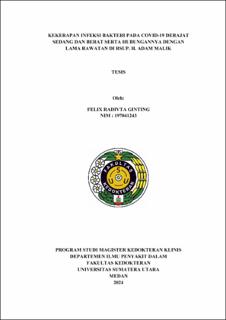| dc.description.abstract | Introduction In December 2019, pneumonia cases with unknown causes emerged in Wuhan, China, leading to the discovery of the novel coronavirus SARS-CoV-2, which causes COVID-19. The disease ranges from mild symptoms to severe complications such as pneumonia, multi-organ failure, and death. Bacterial co-infections in COVID-19 patients exacerbate the severity of the disease and can prolong hospital stays. This study aims to investigate the frequency of bacterial infections in moderate to severe COVID-19 cases and their relationship with the length of hospital stay at Haji Adam Malik General Hospital. Methods A retrospective cohort design was employed, analyzing medical records of COVID-19 patients treated from January to June 2021. The study included patients aged 18 or older with confirmed COVID-19 and signs of bacterial infection. Data collected included demographic information, lab results, COVID-19 severity, and hospital stay duration. Statistical analysis was performed using descriptive statistics and the Chi-square test to assess the relationship between bacterial infections and the length of hospital stay. Results Out of 995 COVID-19 patients, 81 (8.1%) had bacterial infections, with a higher incidence in severe cases (11.8%) compared to moderate cases (5.3%). Infected patients had a median age of 58 years and were predominantly male (60.5%). The majority of bacterial infections were detected in sputum samples (66.7%). Patients with bacterial infections had significantly longer hospital stays, averaging 13 days, compared to 8 days for non-infected patients. The most common pathogens were Acinetobacter baumannii, Klebsiella pneumoniae, and Pseudomonas aeruginosa. Conclusion The study found that bacterial infections are present in 8.1% of COVID-19 patients, with a higher prevalence in severe cases. These infections are associated with longer hospital stays. The findings underscore the importance of accurate diagnosis and appropriate management of bacterial co-infections in COVID-19 patients to improve outcomes and reduce hospital stay durations. Future research should consider factors such as prior antibiotic use and comorbidities to provide a more comprehensive understanding of the impact of bacterial infections on COVID-19. | en_US |


